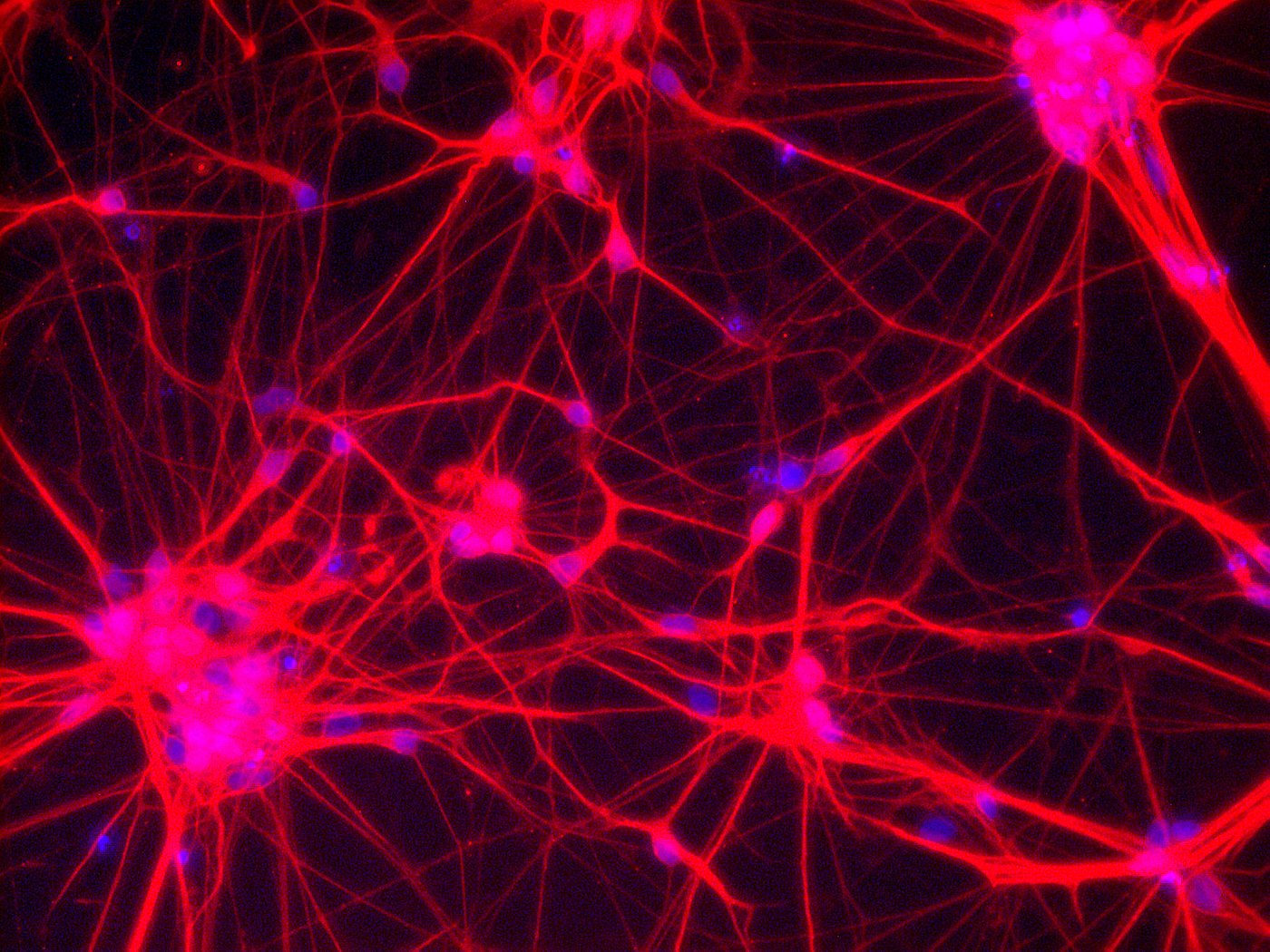
Neurons – Network of neuronal cells (Blue: nucleus; Red: neurons) [Copyright: Institute for Transfusion Medicine, UK Essen]
Professor Maria Adele Rüger is a senior physician in the neurology department at the University Hospital Cologne and at the same time a passionate stem cell researcher. Her research group Neural Stem Cells deals with the mobilization and activation of endogenous neural stem cells and develops non-invasive approaches to stimulate the regeneration by the brain's own neural stem cells in stroke patients.
Could you briefly present your scientific profile to us?
My research group is investigating how the brain's own neural stem cells can be used to improve regeneration in the brain. These endogenous stem cells can still be detected in the brain of humans throughout their life, but they do not contribute much to regeneration in adults when acute damage such as stroke or traumatic brain injury occurs. Even in neurodegenerative or chronic inflammatory brain diseases, their regenerative abilities are exhausted over time. We are trying to understand whether it is possible to somehow motivate these brain stem cells, i.e. those that are available locally and already equipped with all the corresponding abilities, to regenerate again. This can be done not only through the formation of new neurons, but also by affecting trophic factors of neural stem cells, which prevent secondary degeneration, promote plasticity and remyelination, and suppress harmful aspects of inflammatory processes. We investigate pharmacological strategies as well as non-invasive brain stimulation, e.g. using weak direct current through transcranial direct current stimulation (tDCS).
You know everyday life as a clinician and as a researcher. The transfer of research results from the laboratory to the patient requires close cooperation between the two areas. Where do you see the big challenges here? Can this process be accelerated?
In neurology, especially in stroke research, we know the difficulty of transferring data from the basic sciences to the clinic; we speak of "translational roadblock". There are several reasons for this, including the complexity of the human brain and the lack of appropriate model systems. It is particularly important here to carry out the basic scientific preliminary work carefully and comprehensively, and not to push too quickly into clinical application as soon as there is a single positive result. Preclinical studies in experimental models therefore play an important role, which, like clinical studies in humans, should ideally be multi-centered and randomized. In order to get something like this off the ground, appropriate networks and research alliances are needed, so the Stem Cell Network NRW can support us in this way.
How can the inter- and transdisciplinary dialog maintained in the Stem Cell Network NRW help the research field?
The Stem Cell Network NRW brings together scientists from different backgrounds in order to create new ideas through this exchange and to promote cooperations. This is important in order to generate sustainable scientific findings in the long term.
What is your advice for young researchers?
Don't be discouraged by setbacks in experiments - on the way to new insights, everything rarely happens as planned. If you're still at the very beginning: Find a laboratory with good support that motivates you. Later on: Take care of your younger colleagues and share your enthusiasm for science with them.
What is particularly interesting about your professional life?
Like many German university physicians, I am active both in research and in clinical work. This is an organizational challenge on the one hand but also a great opportunity on the other, as basic research can be carried out in an application-oriented way.
If I could make a wish with regard to stem cell research, I would wish that...
...basic research, which still has to be translated into clinical practice, receives as much attention as clinical studies on humans.
What I want to do outside of science in the near future ...
Go on a summer vacation to Scandinavia with my husband and our two children.
Learn more about the research of Prof. Rüger in her research profile.